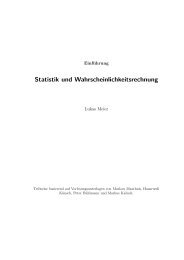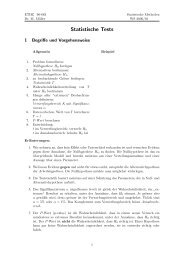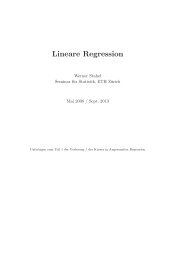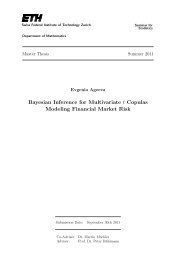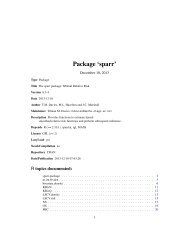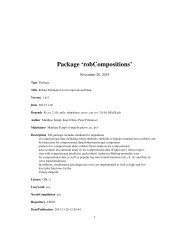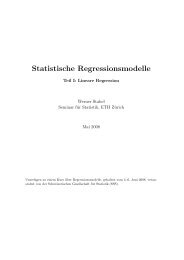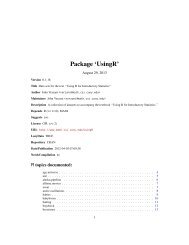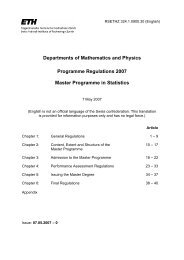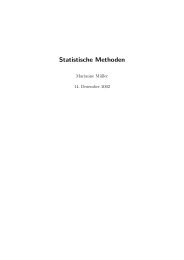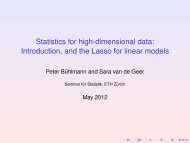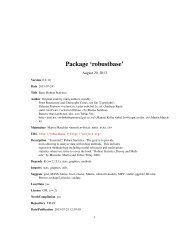Package 'rgenoud'
Package 'rgenoud'
Package 'rgenoud'
Create successful ePaper yourself
Turn your PDF publications into a flip-book with our unique Google optimized e-Paper software.
8 genoud<br />
BFGSburnin<br />
BFGSfn<br />
BFGShelp<br />
The number of generations which are run before the BFGS is first used. Premature<br />
use of the BFGS can lead to convergence to a local optimum instead<br />
of the global one. This option allows the user to control how many generations<br />
are run before the BFGS is started and would logically be a non-negative<br />
integer. However, if BFGSburnin < 0, the BFGS will be used if and when<br />
wait.generations is doubled because at least one gradient is too large, which<br />
can only occur when gradient.check = TRUE. This option delays the use of<br />
both the BFGS on the best individual and the P9 operator.<br />
This is a function for the BFGS optimizer to optimize, if one wants to make it<br />
distinct from the fn function. This is useful when doing lexical optimization<br />
because otherwise a derivative based optimizer cannot be used (since it requires<br />
a single fit value). It is suggested that if this functionality is being used, both<br />
the fn and BFGSfn functions obtain all of the arguments they need (except for<br />
the parameters being optimized) by lexical scope instead of being passed in as<br />
arguments to the functions. Alternatively, one may use the BFGShelp option<br />
to pass arguments to BFGSfn. If print.level > 2, the results from the BFGS<br />
optimizer are printed every time it is called.<br />
An optional function to pass arguments to BFGSfn. This function should take an<br />
argument named ‘initial’, an argument named ‘done’ that defaults to FALSE, or<br />
at least allow ... to be an argument. BFGSfn must have an argument named<br />
‘helper’ if BFGShelp is used because the call to optim includes the hard-coded<br />
expression helper = do.call(BFGShelp, args = list(initial = foo.vals), envir = e<br />
which evaluates the BFGShelp function in the environment of BFGSfn (fn is just<br />
a wrapper for BFGSfn) at par = foo.vals where foo.vals contains the<br />
starting values for the BFGS algorithm. The ‘done’ argument to BFGSfn is used<br />
if the user requests that the Hessian be calculated at the genoud solution.<br />
control A list of control parameters that is passed to optim if BFGS = TRUE or P9 > 0.<br />
Please see the optim documentation for details.<br />
optim.method<br />
transform<br />
A character string among those that are admissible for the method argument to<br />
the optim function, namely one of "BFGS", "L-BFGS-B", "Nelder-Mead", "CG",<br />
or "SANN". By default, optim.method is "BFGS" if boundary.enforcement < 2<br />
and is "L-BFGS-B" if boundary.enforcement = 2. For discontinuous objective<br />
functions, it may be advisable to select "Nelder-Mead" or "SANN". If selecting<br />
"L-BFGS-B" causes an error message, it may be advisable to select another<br />
method or to adjust the control argument. Note that the various arguments of<br />
genoud that involve the four letters “BFGS” continue to be passed to optim even<br />
if optim.method != "BFGS".<br />
A logical that defaults to FALSE. If TRUE, it signifies that fn will return a numeric<br />
vector that contains the fit criterion (or fit criteria if lexical = TRUE), followed<br />
by the parameters. If this option is used, fn should have the following general<br />
form in its body:<br />
par



